
Event Details
- This event has passed.
Data Justice, AI, and Design Colloquium
How to Attend:
This event will be held on February 9th, 2023 9:00am-5:30pm. Participants are invited to attend in-person at A. Alfred Taubman Wing Commons. More details can be found here:
https://midas.umich.edu/data-justice-and-design/
All are welcome to attend the colloquium. No registration in advance is required.
About:
In the rapidly emerging field of design aided by neural networks, one question seldom emerges: where does the data come from? This colloquium, presented by MIDAS, AR²IL, Taubman College, and ESC, brings together experts in architecture, data science, and AI to discuss an equitable and inclusive approach to data harvesting for design.
The goal of this colloquium is to explore the current status of the use of data in ML approaches in design and critically interrogate the methods of creation – in particular, exploring the implementation of data justice. It is the perfect moment to do this, before it is too late and the common creation of datasets for design is executed without consideration of the ethical implications of racial bias in data for architecture design. The discussion and debate between these speakers will generate new insight and new knowledge that might help in the further development of AI and design.
Speakers:
Morning Sessions
SESSION 1: A Ground Truth in Data Justice (9:30AM-10:50AM)
Chair:
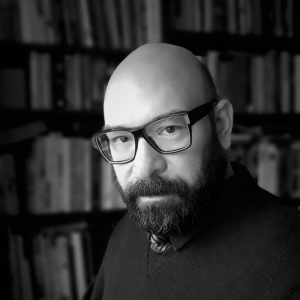
Matias del Campo is the co-founder of the architecture practice SPAN. The practice gained wide recognition for the design of the Austrian Pavilion at the 2010 Shanghai World Expo and, more recently, for the Robot Garden at the Ford Robotics Building. SPAN’s work was featured at the Venice Architecture Biennale in 2012 and 2021, at ArchiLab in 2013, and at the Architecture Biennale in Vienna and Buenos Aires in 2019. Solo shows include ‘Formations’ (MAK, Vienna) and ‘Sublime Bodies’ (Fab Union, Shanghai). SPAN’s work is in the permanent collection of the FRAC, the MAK, the Benetton Collection, the Albertina, the Pinakothek Munich, and several private collections.
His publishing work includes two editions of AD – Evoking through Design and Machine Hallucinations (co-edited with Neil Leach) as well as the books Neural Architecture – Design and Artificial Intelligence (ORO Editions 2022) and Sublime Bodies (co-authored with Sandra Manninger, Tongji Press 2017).
Speakers:
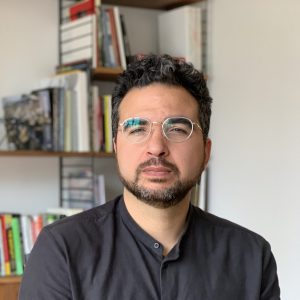
Jose Sanchez is an Architect, Game Designer, and Theorist based in Detroit, Michigan. He is the director of the Plethora Project, a research studio investing in the future of the propagation of architectural design knowledge. He is the creator of the video games Block’hood and Common’hood, digital social platforms that aid the authoring of architectural and ecological thinking to non-expert audiences. He is the author of the book “Architecture for the Commons: Participatory Systems in the Age of Platforms” published by Routledge in 2020 and the co-creator of Bloom, a crowdsourced interactive installation which was the winner of the Wonder Series hosted by the City of London for the 2012 Olympics.
He has taught in renowned institutions in the United States and in Europe, including the Architectural Association in London, The Bartlett School of Architecture at University College London, at the University of Southern California. He is currently at the University of Michigan, where he is an Associate Professor at the Taubman College School of Architecture. His research “Architecture for the Commons” designs and interrogates social media platforms as tools with the potential to author architectural content in the public domain.

Catherine Griffiths is a media artist, designer, and researcher exploring critical code and algorithmic aesthetics in the context of machine learning ethics. By creating simulations, short films, and software applications, her hybrid practice-theory-based creative research attempts to make palpable invisible computational forces that shape power and social dynamics. Drawing on the legacy of generative art, the recent rise in artificial intelligence, and critical theory, she seeks to contribute to an emerging arts knowledge. As an Annenberg Fellow, she is a Ph.D. candidate in Interdisciplinary Media Arts at USC’s School of Cinematic Arts.
She received her MArch in Architectural Design from The Bartlett, University College London, and her BA in Fine Art from Camberwell College, University of the Arts London. Her research has been exhibited in the Centre Pompidou, Paris, and published in the Journal of Digital Culture and Society and the Journal of Science and Technology of the Arts. Today she is an Assistant Professor at the University of Michigan with a joint appointment between Taubman College of Architecture and Urban Planning and the Digital Studies Institute.

Shelby Elizabeth Doyle, AIA is a registered architect and Associate Professor of Architecture where she is the Stan G. Thurston Professor of Design Build at Iowa State University College of Design, co-founder of the ISU Computation & Construction Lab (CCL), and director of the ISU Architectural Robotics Lab (ARL). The CCL and ARL the result of Doyle’s ISU Presidential Impact Hire to rethink digital fabrication and design-build. The CCL works to connect developments in computation to the challenges of construction: through teaching, research, and outreach.
The central hypothesis of CCL and Doyle’s work is that computation in architecture is a material, pedagogical, and social project; computation is both informed by and productive of architectural cultures. This hypothesis is explored, through the fabrication of built projects and materialized in computational practices. The CCL is invested in questioning the role of education and pedagogy in replicating existing technological inequities, and in pursuing the potential for technology in architecture as a space of, and for, gender equity.
SESSION 2: Artificial Intelligence vs Design Intelligence (11:20AM-12:40PM)
Chair:
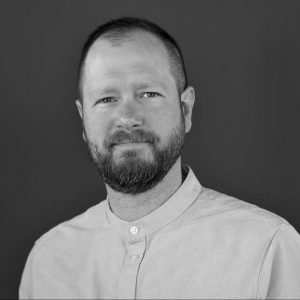
McLain Clutter is an associate professor and chair of the architecture program at the University of Michigan’s Taubman College of Architecture and Urban Planning. As an architect, Clutter’s work focuses on the role of architecture within the multidisciplinary milieu of contemporary urbanism, and the interrelations between architecture and media culture. His work has been featured in Grey Room, Thresholds, MONU, 306090, the Journal of Architectural Education, Plat, The Avery Review, ARPA Journal, the edited volume Formerly Urban: Projecting Rustbelt Cities, and other publications. He has exhibited work in international venues, including the 7th Bi-City Biennale of Urbanism\Architecture in Shenzhen, the Architecture League of New York, Materials & Applications in Los Angeles, and others. Clutter’s design and research has been awarded an Architect Magazine R+D Award in 2015, ACSA Faculty Design Awards in 2015 and 2018, and other honors. His research has received support from the Graham Foundation for Advanced Studies in the Fine Arts. Clutter’s book, Imaginary Apparatus: New York City and its Mediated Representation was published by Park Books in 2015. He is a Registered Architect in the state of Michigan, and a member of the Editorial Board for the Journal of Architectural Education.
Clutter received a B.Arch from Syracuse University and an MED from the Yale School of Architecture, where he was the recipient of the Everett Victor Meeks Fellowship. Prior to arriving at Taubman College, Clutter practiced in offices in New York and Chicago, working on projects ranging in scale from residential renovations to campus master planning. He is a partner in the Ann Arbor based design practice EXTENTS, with Cyrus Peñarroyo.
Speakers:
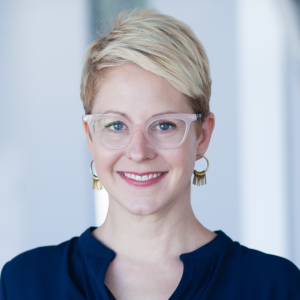
Molly Wright Steenson is a historian of design, architecture, and the history of those concepts alongside cybernetics and artificial intelligence. Her current research focuses on the idea of artificial intelligence and how it’s viewed and portrayed in contemporary media and culture. She argues that our ideas of artificial intelligence are outdated and this inhibits peoples’ ability to understand what it really is. Her book Architectural Intelligence: How Designers & Architects Created the Digital Landscape, published with Graham Foundation support, combines “an architectural history of interactivity and an interactive history of architecture.”
Steenson holds a PhD in Architecture from Princeton University, a Master’s in Environmental Design from Yale School of Architecture, and a BA in German from the University of Wisconsin-Madison.

Sarah Fox is an Assistant Professor in the Human Computer Interaction Institute at Carnegie Mellon University, where she directs the Tech Solidarity Lab. Her research examines how technological artifacts challenge or propagate social exclusions. She holds a Ph.D. in Human Centered Design & Engineering from the University of Washington.
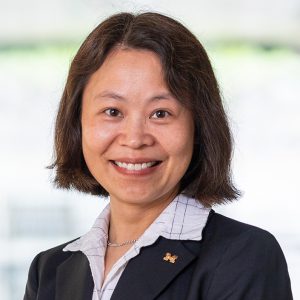
Mingyan Liu is an electrical engineering and computer science professor, and the Peter and Evelyn Fuss Chair of Electrical and Computer Engineering at the University of Michigan, Ann Arbor, MI. Her research is in optimal resource allocation, sequential decision theory, incentive design, online learning, and modeling and mining of large scale Internet measurement data concerning cyber security. She was a co-founder of the cybersecurity scoring startup Quadmetrics in 2014. Quadmetrics was named a “2016 Cool Vendor in Risk Management” by Gartner, and was acquired by FICO in 2016.
Afternoon Sessions
SESSION 3: Games, Art and the Ethics of Data (2PM-3:20PM)
Chair:

Kathy Velikov is a licensed Architect and founding partner of the research-based practice rvtr (www.rvtr.com), and the former President of ACADIA (Association for Computer Aided Design in Architecture). Her work investigates and experiments with the intertwinements across architecture, the environment, technology, and sociopolitics through design methods that mobilize systems-based approaches and computational design. Her work ranges from material prototypes that explore environment-aware behavioral building skin assemblies, to high-performance building design, to research on urbanism, infrastructure, and territorial practices explored through techniques of mapping and analysis, speculative design propositions, installations, and writing.
She is co-editor of Ambiguous Territory: Architecture, Landscape, and the Postnatural (Actar, 2022) and co-author of Infra Eco Logi Urbanism (Park Books, 2015). Honors include the ACSA/AIA Housing Design Education Award (2020), the Technology + Architecture Design (TAD) Journal Research Contribution Award (2020), two R&D Awards from Architecture Magazine (2010, 2016), a Journal of Architectural Education Best Design as Research Article (2013), the Architizer A+ Award Program’s Architecture + Sound Jury Award (2013), the Association of Collegiate Schools of Architecture Faculty Design Award (2012, 2014), a Royal Architectural Institute of Canada Award of Excellence for Innovation in the Practice of Architecture (2011), the Canadian Professional Prix de Rome (2009), the Architectural League of New York’s Young Architect’s Forum Award (2008), and the Oberdick Fellowship at Taubman College (2006-07). Kathy received her professional degree from the University of Waterloo and masters from the University of Toronto.
Speakers:
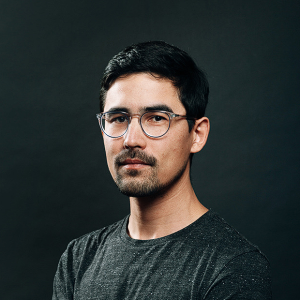
Mitchell Akiyama is a Toronto-based scholar, composer, and artist. His eclectic body of work includes writings about sound, metaphors, animals, and media technologies; scores for film and dance; and objects and installations that trouble received ideas about history, perception, and sensory experience. He holds a PhD in communications from McGill University and an MFA from Concordia University and is Assistant Professor of Visual Studies in the Daniels Faculty of Architecture, Landscape, and Design at the University of Toronto.

Matias del Campo is the co-founder of the architecture practice SPAN. The practice gained wide recognition for the design of the Austrian Pavilion at the 2010 Shanghai World Expo and, more recently, for the Robot Garden at the Ford Robotics Building. SPAN’s work was featured at the Venice Architecture Biennale in 2012 and 2021, at ArchiLab in 2013, and at the Architecture Biennale in Vienna and Buenos Aires in 2019. Solo shows include ‘Formations’ (MAK, Vienna) and ‘Sublime Bodies’ (Fab Union, Shanghai). SPAN’s work is in the permanent collection of the FRAC, the MAK, the Benetton Collection, the Albertina, the Pinakothek Munich, and several private collections.
His publishing work includes two editions of AD – Evoking through Design and Machine Hallucinations (co-edited with Neil Leach) as well as the books Neural Architecture – Design and Artificial Intelligence (ORO Editions 2022) and Sublime Bodies (co-authored with Sandra Manninger, Tongji Press 2017).
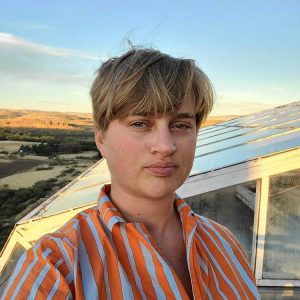
Leah Wulfman is a Carrier Bag architect, educator, game designer, digital puppeteer, and occasional writer. Trained as an architect, Wulfman has been assembling hybrid virtual and physical spaces in order to prototype new relationships to technology and nature, as well as challenge normative ideologies so often reinforced by technology and architecture. In addition to mixed reality installations that play with and emphasize the physical, material basis of everything digital, they are presently working on a research series focusing on gamified environments, interactions and materials—traversing a variety of themes like ‘Deep Unlearning,’ Stone Soupercomputers, GamerGirl Bath Water, and our potential interactions with a Jacaranda Tree in full bloom witnessed through Google Earth.
Wulfman holds a Bachelors of Architecture degree from Carnegie Mellon University, as well as a Masters of Arts in Liam Young’s Fiction and Entertainment program at SCI-Arc. They have taught at numerous institutions in the United States, including SCI-Arc, ArtCenter’s Media Design Practices Graduate Program, IDEAS Program at UCLA Architecture and Urban Design, and The School of Architecture at Taliesin, where they have developed youth programming and mixed reality coursework. Wulfman’s work experience can be likened to playing musical chairs, with collaborative projects presently underway with Studio Elana Schlenker as well as the LA-based artist Lauren Halsey.
Their research and design work has been supported by numerous residencies and publications, and has been shown as part of various exhibitions and festivals, including Tbilisi Architecture Biennial, The FiDi Arsenale, Space Saloon Design and Build Festival, Open Engagement, VIA Festival for Electronic Art and Music, A Queer Query, and The Wrong Biennale for New Digital Art. Leah is now at the University of Michigan, where they are currently the Walter B. Sanders Fellow at the Taubman College School of Architecture.
SESSION 4: Final Roundtable (3:40PM-5:30PM)
This event is hosted by the Michigan Institute for Data Science (MIDAS), and is co-sponsored by the Center for Ethics, Society & Computing (ESC), Taubman College, and AR²IL.


